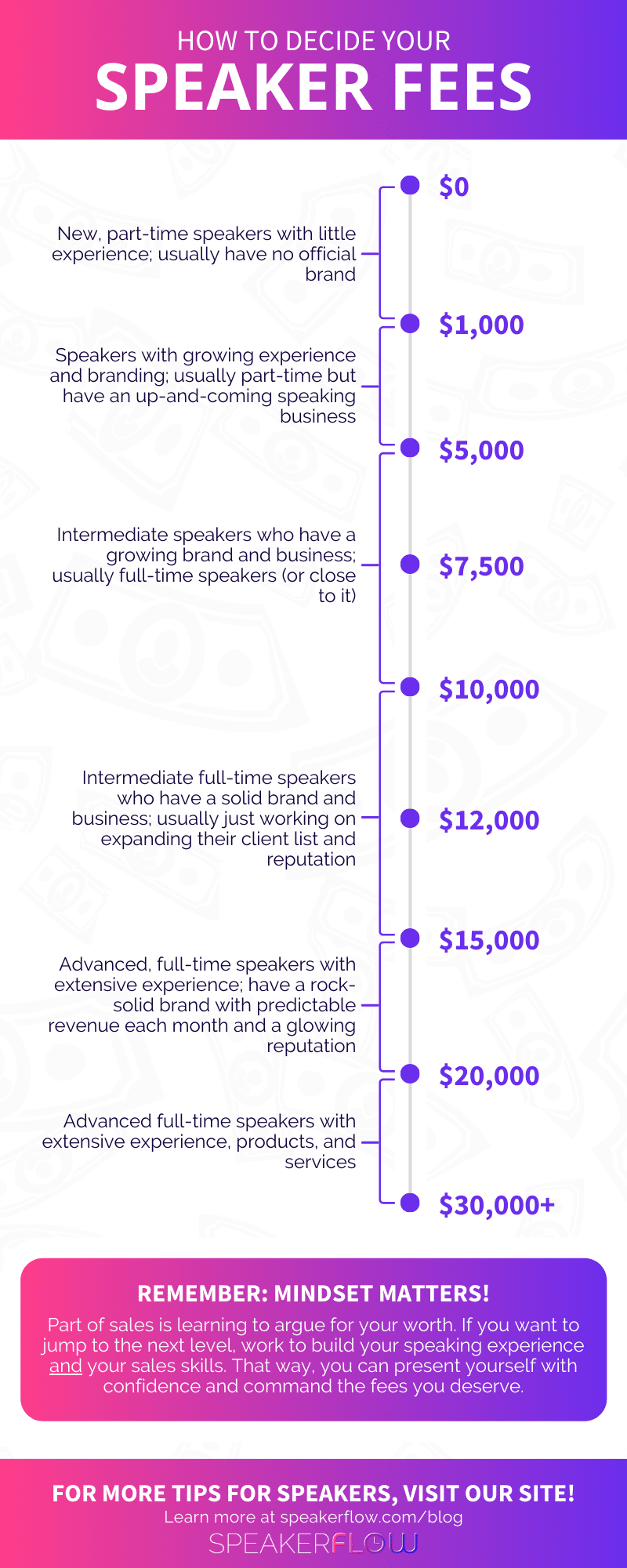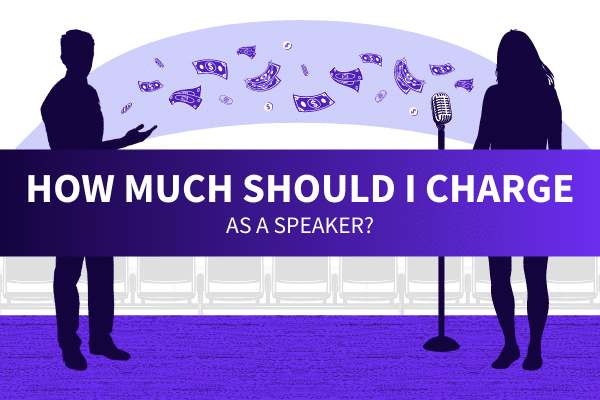Among professional speakers, one of the most common challenges is sales. From setting sales goals to meeting them, many speakers don’t advocate for their worth, simply out of anxiety or because they’re overwhelmed by all of the sales advice out there. In fact, according to a 2021 survey, 50% of speakers say that – between sales, operations, and marketing in their business, sales makes them the most anxious. As a result, many are left asking “How can I gain confidence in my sales abilities?” and “How much should I charge as a speaker?”
Speaking fees vary widely from speaker to speaker, so there’s no “one size fits all” answer. In a nutshell, this is because your speaking fees are determined by three things. First is your self-worth or the value you see in your own skills, products, and services. Second is your sales processes (i.e. the strategies that help you manage speaking opportunities on your radar). Third is confidence, plain and simple.
In the following guide, we’ll break down the basics of setting speaking fees, so you can master each of these areas. We’ll also cover four ways to boost your fees over time and how to benchmark them if you’re starting from scratch. That way, in the coming months, you can build your confidence in your sales efforts and meet your revenue goals this time around.
Ranges of Speaking Fees
Before answering “How much should I charge as a speaker?” let’s look at a few examples. As mentioned above, depending on who you ask, the recommended speaking fee can vary immensely from a few thousand dollars to more than $30,000. Although this is primarily due to the factors above – self-worth, sales strategies, and confidence – it also depends on the speaker’s experience. If you’re a world-renowned speaker, for instance, you’ll be able to charge much more than if you’re new to the game. Below, we’ll examine three brackets of speaking fees, so you can see where you best fit in and start from there. 👍
$0 – $10,000 Per Speaking Gig
The first speaker fee bracket is from $0 to $10,000 per event. Although many speakers may begin speaking for free – and feel pressured to do so for a prolonged period of time – this bracket is largely about self-worth. Even if you don’t have a lot of speaking experience, you don’t necessarily have to speak for free. You just have to be well organized, confident in your message, and certain that you can provide value for your audience.
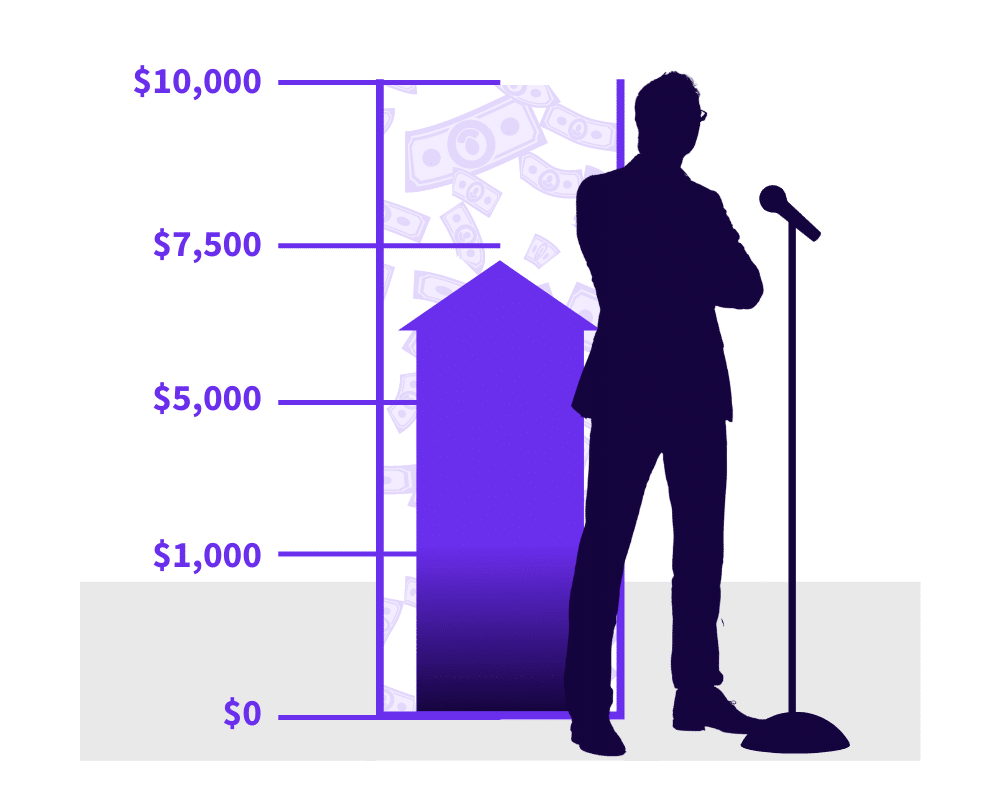
To accomplish this (and build towards the $10,000 end of the bracket), start with the following checklist.
- Design a brand for your speaking business or hire a freelance designer to do so for you. It doesn’t have to be perfect and you can always change it later. But the more polished you and your business look, the more event planners will pay for your services.
- Organize your speaking collateral. You should have a website, descriptions of your speaking programs and what listeners gain from them, a speaker bio, and headshots. Again, it’s okay to start simple if your budget is tight and update these later.
- Start tracking the results audiences and their leadership teams see from your presentations. Data is power, and the more you can prove your worth, the easier it will be for you to charge higher fees.
Summarily, although you may have to speak for free initially (to build your clout and capture video of your speaking skills), set a deadline for yourself after which you’ll charge more. Long term, it can take years of experience to jump from this bracket to the next. But, if you invest in the steps above (in terms of time, energy, and money), that timeframe can decrease dramatically.
$10,000 – $30,000 Per Speaking Gig
The middle speaker fee bracket is from $10,000 to $30,000 per event. Unlike the previous bracket, this one is all about clout and building demand for your goods and services. By the time you’re within this bracket, you should be able to communicate your value and have solid brand assets. Essentially, answering “How much should I charge as a speaker?” within this group depends on the amount of value you provide and how well you can prove it.
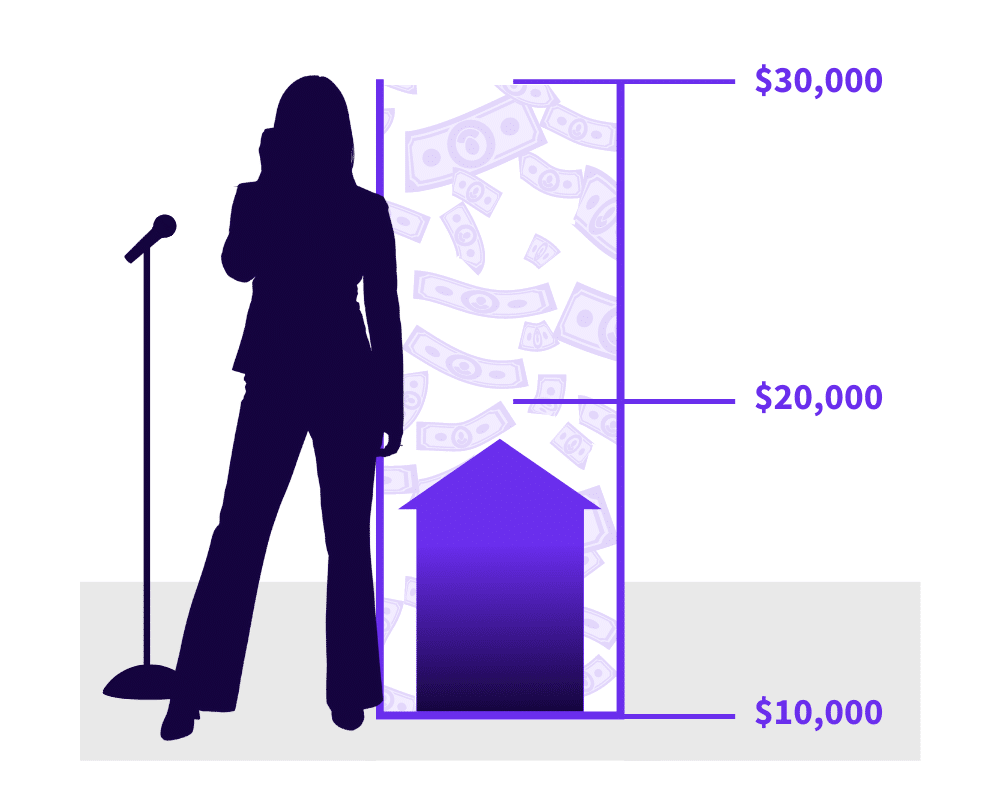
In order to argue for your worth and increase your fees past $10,000 per gig, make sure you’ve checked the following items off your list.
- Update your brand if you haven’t done so within the last five years. At this point, every aspect of your business should be uniformly branded, reflective of your speaking persona, and up-to-date design-wise.
- Get a professional speaker reel if you haven’t already. This shows event organizers what you look and sound like on stage, so they can picture you on theirs. Plus, it shows your dedication to providing quality speeches.
- Build your social proof, including your social profiles, video testimonials for your website, and any written testimonials to feature in your printed collateral. The more happy clients and audience members you can highlight, the more valid your fees.
In addition to these steps, never stop iterating on your sales processes. For many speakers, increasing their fees becomes impossible because their sales efforts aren’t working but, instead of adjusting them, they give up. They rely solely on referrals and tell themselves “there just aren’t any good leads out there right now.” In your own business, don’t make this mistake. Instead, stay constructively critical of your sales skills, strategies, and tools. That way, you’re always improving and able to charge increasingly higher fees.
$30,000+ Per Speaking Gig
The third – and most coveted – speaker fee bracket is from upwards of $30,000 per event. In most cases, speakers in this bracket are far from ordinary people. They’re celebrities, CEOs, politicians, movie stars, musicians – people who “fill the seats” because of their fame as well as their speaking focus.
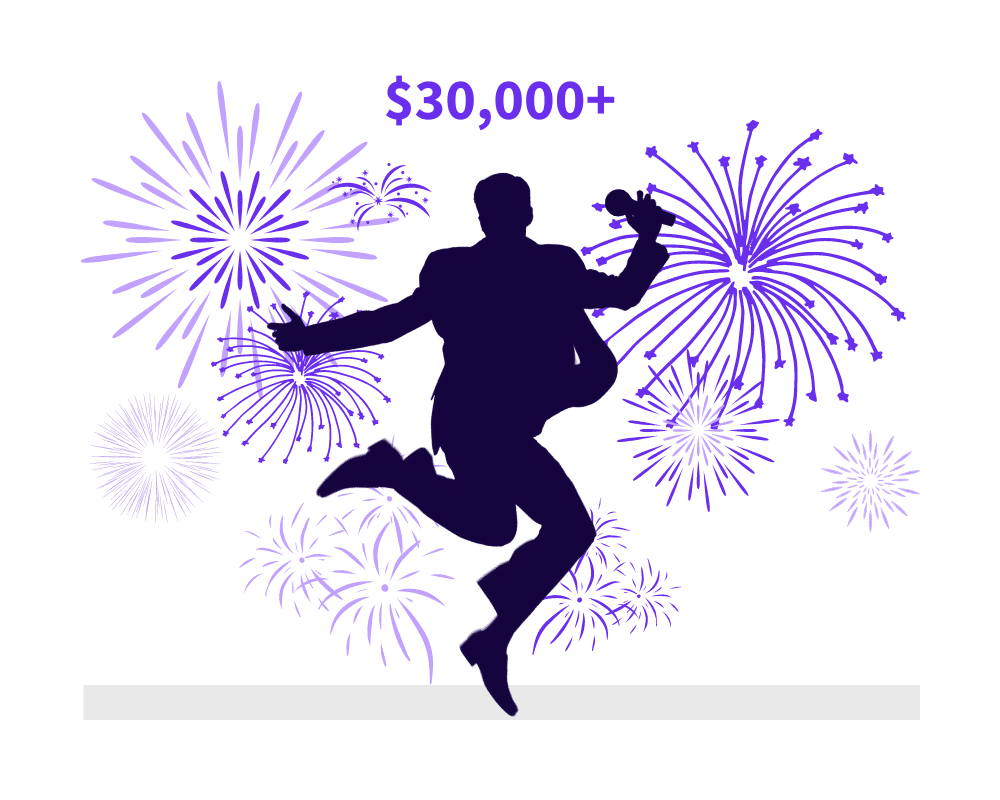
Consequently, for the vast majority of professional speakers, this bracket is incredibly difficult to reach through speaking alone. However, by offering additional services or building speaking “packages,” many offer contracts that fall into this bracket without a problem.
To do the same in your speaking business, ask yourself, “What additional resources would help my audiences implement the insights from my speeches?” Below are a few examples from our own clients to help you brainstorm.
- Multiple Keynotes: Offer to provide both the opening and closing keynotes for the event as well as mingling with audience members after each one. That way, they’re guaranteed that the event will kick-off and end with the same energy and impact.
- Mid & Post-Event Support: Offer a keynote or presentation followed by additional support afterward. This can be coaching for their executive team, consulting with their support staff, etc.
- Add-On Resources for Everyone: Offer a keynote or presentation along with additional resources for everyone in attendance. Common add-ons among speakers include book copies, coursework, workbooks, and access to membership sites.
In short, while the previous brackets may have led you to speak for the same client more than once, the large contracts in this bracket allow you to build long-term relationships. That way, you can support them long after you’ve stepped offstage and solidify your reputation as their go-to expert. Win, win!
How to Benchmark Your Speaking Fees
If you’re unsure how much you should charge per event currently, there are a few ways to pinpoint a number. First and foremost, considering the brackets above, take stock of your business as it exists right now. Ask yourself, “Is my personal brand a work in progress?” and “Do I have a reasonable amount of speaking experience?” (i.e. are you comfortable with your speaking skills). Answering “yes” to both of these questions makes you closer to the $10,000 benchmark (although, for reference, the average speaker fee as of 2021 was between $1,000 – $5,000).
Second, take a frank look at the value of your presentations. The more qualified a speaker you are – and the higher your fees – the more value you are expected to provide for your clients. If data from your past events doesn’t show a positive impact from your participation (or if you have not spoken enough to have data in the first place), consider sticking with a lower fee for the time being. Then, build towards the next “level” as you collect data.
Lastly, consider other speakers whose messages are similar to yours. Look at their brand, the content of their presentations, anything public about them to see how you compare. Where possible, look at their past event appearances to see how much they charged. Essentially, your goal is to learn from them, copy their strategies, and gain confidence that even if you’re not at their level yet, you can be. Then, look for speaking opportunities so you can mimic their strategies and test to see what works for your brand, too.
How to Bolster Your Speaking Fees
All in all, answering “How much should I charge as a speaker?” is an ongoing question. Today, you may fall into the first bracket – sure. But what about a year from now? What about three years from now or five or ten?
Long-term, your fees should increase based on your involvement in your speaking business and the things you offer in the process. As your business grows, your fees should grow alongside it, and, as your experience broadens, you should be able to charge more per individual product or service. After all, you’re an expert more than anything else. That makes your time the real commodity in your business, and the more successful you are, the busier you are and the more that time is worth.
With that in mind, as you head into the coming months, aim to steadily increase your fees, both for speaking events and your other offerings. Below are four strategies to help you hit the ground running.
Become An Author
Nowadays, it can seem like every speaker has a book, but the fact remains that authorship does help you stand out. From an event organizer’s perspective, a book demonstrates your knowledge of the subject as well as your authority. It also gives you a chance to offer copies of your book as part of a speaking package, as mentioned previously. Each of these selling points, in turn, gives you leverage as you argue for higher fees. Plus, you can sell copies passively through your website, giving you an extra revenue stream on top of your event income.
Highlight Your Previous Successes
Nothing proves your worth and validates your fees as much as evidence for your skills. With each client, make a point to circle back after the event for their feedback and a testimonial. While the former helps you adapt and improve over time, the latter shows your impact for that client in the present. Over the years, as you collect these records, you’re better able to say to a potential client, “I accomplished this for them. Would you like the same result for your team?”
In short, as the socio-political critic Christopher Hitchens once said, “What can be asserted without evidence can be dismissed without evidence.” Confidence and a good sales strategy will get you far, but nothing closes a deal more easily than cold, hard facts.
Build Your Social Clout
Like collecting testimonials, building your social presence directly relates to your speaking fees. Whether you’re appearing on your social media profiles or sharing content, being social with past, present, and potential audience members makes you approachable and makes them more likely to be open to your insights. Additionally, contributing to content channels in your focus industries adds to your credibility. When done consistently, it shows that you know what you’re talking about and you’re dedicated to serving that industry long-term, both of which command higher speaking fees.
Setting Your Speaking Fees Moving Forward
Ultimately, answering the question, “How much should I charge as a speaker?” is tricky. Depending on your speaking experience, confidence, and sales skills, you may be charging well below your value without even knowing it. If so, I get it – sales can be daunting, and it takes time to build the tenacity and sales-savvy to increase your fees.
Considering these challenges, hopefully, this guide provided some clarity in the sea of speaker sales information. For more information about setting speaking fees, check out speaker and marketing expert David Newman in our podcast episode, “3 Reasons Why You’re Not Getting The Fees You Deserve.”
Additionally, for business technology tailored to the speaking industry, check out our operating system! Based on feedback from previous clients and connections, this system is customized to meet the needs of you and your team so you can build the speaking business of your dreams. Just visit our systems page or shoot us an email at [email protected] to learn more. 🙌
